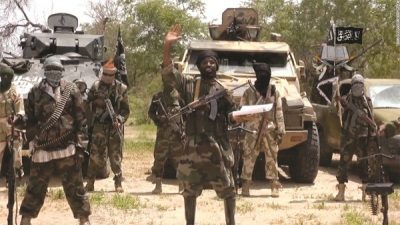Boko Haram surrender, a Trojan horse?
Over the past weeks, we have seen hundreds of members of the dreaded Boko Haram sect come out of their hideouts to surrender to the troops of Nigerian Army and more are still coming out in dramatic ways that could not but raise some eyebrows. Ordinarily, this is supposed to be good news as no war in history has come to an end on the battlefield but on the table of forgiveness and negotiations.
But we must be mindful of what could turn out to be a trojan horse. In computing, trojan horse is a program designed to breach the security of a computer system while ostensibly performing some innocuous function. Remember the hollow wooden statue of a horse, in which the Greeks were said to have concealed themselves to enter Troy during the war.
In March, the governor of Borno State, Babagana Zulum stated that the Operation Safe Corridor, launched in 2016 for the deradicalisation and rehabilitation of ex-Boko Haram members with the aim of reintegrating repentant Boko Haram members into society is not working and must be reviewed.
A typical example of how dangerous the massive surrender could turn out if not properly handled or reviewed is already happening in Afghanistan with Taliban taking over 80% of the country after withdrawal of the United States troops.
Another critical factor is to understand the true reasons behind the massive surrender this time. Various stories have emerged in this regard, nevertheless, the official one is that they are running from the heavy military artillery bombardment to save their lives.
But it could also be that they are from the Shekau faction who have not pledged allegiance to ISWAP and so do not have weapons to protect themselves. Most of them are coming out empty handed using women and children as shields. What will it take for them to go back to the bushes when their comrades acquire the capacity to stand against the other faction? History has shown that most people who renounce their ideology due to the force of circumstances end up regrouping when its convenient.
If we are to be good students of history in the northeast with respect to these crises, then we must remember, the only way to end conflicts as indeed this one, is through forgiveness, negotiations, rehabilitation and non-punitive transitional justice.
We are at a deciding moment where we must choose between continuation of a decade-long insurgency that continues to claims lives or forgive and work towards rebuilding our lost glories.
To aid forgiveness and acceptance of the communities especially those who have lost loved ones, the security men who have lost colleagues, and the generally traumatised people, its pertinent to ensure all internally displaced persons are peacefully resettled. Those remaining insurgents who still attack security posts and kidnap travellers and raze villages must be neutralized. In any case, it is difficult to accept and forgive if the killings of innocents are still ongoing. It is difficult to forgive, if people can still not access their farms. It is not easy to forgive, if people can still not travel out in peace.
- Musa Gambo, writes from Maiduguri.


